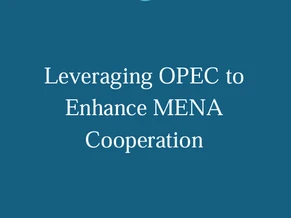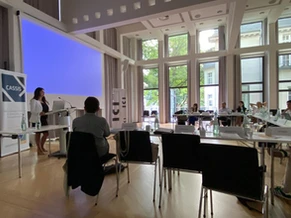
Climate change is not just an environmental concern; it is a multifaceted challenge that affects socioeconomic factors, public health, and even geopolitical stability. The Middle East and North Africa (MENA) region, in particular, is highly vulnerable to the adverse effects of climate change. With its arid climate, rapid population growth, and socio-economic disparities, the region faces significant risks such as increased desertification, water scarcity, extreme weather events, and rising sea levels. To address these challenges and seize the opportunities for regional cooperation, the MENA2050 Climate Action Committee (CAC) has been established.
The objective of the MENA2050 CAC is to implement innovative solutions that mitigate the effects of climate change in the region. Recognizing the potential for positive social and economic outcomes, the committee aims to achieve green prosperity by reducing greenhouse gas emissions, ensuring food security, conserving resources, reducing energy costs, and promoting resilient infrastructure.
To accomplish these goals, a comprehensive and multidimensional approach is necessary, involving various sectors such as energy, transportation, buildings, industry, food security, water, and waste management. Governments, non-profit organizations, the private sector, civil society, and individuals all have a crucial role to play in driving climate action. Governments should enact policies and regulations that incentivize green practices and discourage emissions, while corporations should explore alternative production models and sustainability reporting. Civil society can contribute by adopting sustainable behaviors and supporting government efforts, while individuals can influence policymakers and embrace eco-friendly lifestyles.
The CAC serves as a platform for collaboration among climate scientists, innovators, entrepreneurs, investors, policymakers, and other stakeholders. Its mission is to identify, test, and implement new approaches to mitigate climate risks and share best practices and knowledge related to climate change. The committee will host workshops, conferences, and webinars to facilitate exchange and cooperation among stakeholders.
Furthermore, the CAC will provide grant funding to support research and startup ventures focused on climate change solutions. By doing so, it will foster innovation and resource sharing in addressing climate change in the MENA region.
The committee recognizes that there is no one-size-fits-all solution to climate change in the MENA region. However, it has proposed several approaches to mitigate and adapt to the effects of climate change. These include promoting renewable energy sources, such as solar, wind, geothermal, and hydrogen energies, to reduce carbon emissions and diversify the energy mix. Additionally, discussions on the introduction of nuclear energy in the energy mix, with a focus on objective analysis and regional cooperation on nuclear safety, could also be considered.
Sustainable transportation initiatives, such as promoting public transportation and cycling and reducing reliance on private vehicles and diesel fuel, can help reduce emissions in the transportation sector. The committee also emphasizes the importance of smart cities and buildings that incorporate low-carbon innovations to reduce emissions and adapt to climate change.
Addressing the water-agriculture/food/energy nexus is critical for the MENA region’s resilience. Initiatives to fight desertification, manage water and wastewater efficiently, and enhance food security through sustainable agricultural practices are key components of the committee’s approach. The CAC also highlights the value of early warning systems to enhance climate resilience, reduce vulnerability, and mitigate the impacts of climate-related disasters.
The MENA2050 CAC aims to create a future that prioritizes collective action, green prosperity, and climate resilience for all. It calls for ambitious commitments from governments, organizations, businesses, and individuals. By leveraging regional cooperation, knowledge sharing, and innovative solutions, the committee strives to turn the immense climate change threat into an opportunity for a sustainable and prosperous MENA region.
Sincerely, Eli Bar-On MENA2050 Executive Director
Dr. Hakima El Haité Head of the MENA2050 Climate Action Committee and a member of the Advisory Board




